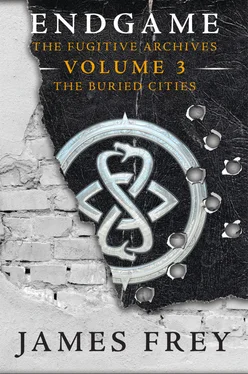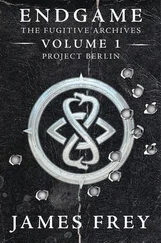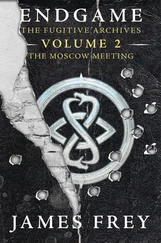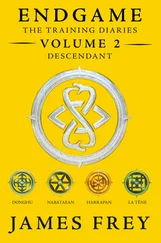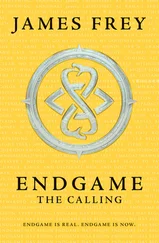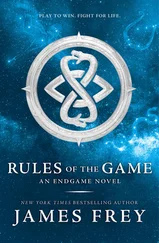Brecht holds the key up as if it’s a holy relic. “I do,” he says. “Of course, we won’t know until we put it in the door.”
“Which is where?” Boone asks him. He sounds impatient, and I can tell he is annoyed. As am I. Brecht has just made our mission even more difficult.
Brecht points a finger toward the floor. “Down there,” he informs us. “In the underground city.”
Boone sighs wearily. “Don’t tell me,” he says. “You’re not sure exactly where it is.”
Brecht shrugs. “I have an idea,” he says. “The map was not entirely specific, so we might have to try a number of possibilities.”
Suddenly I feel very weary. These are questions Boone and I should have asked before we even began the journey here. That we didn’t is worrying to me. It suggests that we are losing our edge as Players. Or perhaps we are afraid to admit that we are running out of options, and are hoping that if we only keep moving forward, everything will be all right. More and more, I am finding it difficult to separate my personal feelings from what I should do as a Player of Endgame. Then I remind myself that as far as my line is concerned, I am not a Player anymore. Now I am Playing for myself alone, or perhaps for myself and Boone. Maybe even for humanity itself. But to what end? I still don’t know. But something keeps me Playing. I want to win, even if I don’t know what winning means anymore.
“I know where it is.”
We all look at the girl, Kelebek. She is standing beside the old woman.
“The door,” she says, in case we have not understood her meaning. “I know where it is.”
Yildiz says something in rapid-fire Turkish. I don’t understand all of it, but I get that she’s telling the girl to be quiet. She sounds almost fearful. Kelebek silences her with a curt nod of her head, then says, “My friends and I have spent many hours here. I can take you to the door.”
“You play here?” Brecht says. “Despite the legends?”
“I am not afraid of legends,” Kelebek says.
Brecht laughs. “Brave girl,” he says. “Very well, then. Let’s be on our way.”
Kelebek shakes her head. “It is getting dark,” she says. “We must wait until morning.”
“What difference does it make?” Ott asks. “Underground it’s always dark. We’ll have to use flashlights whether it’s day or night.”
“We won’t,” the girl says. “You’ll see. Tomorrow. Tonight, we camp.”
She doesn’t wait for a reply from any of us, but turns and walks out of the room and down the stairs. Brecht laughs again. “I suppose we have no choice,” he says, and starts off after Kelebek.
Ott looks at me and Boone. “Are we taking orders from a child now?”
“Unless you know where the door is, I think we are,” he says.
Ott grunts. I look over at Yildiz, who still seems upset by what’s happened. “Are you all right?” I ask her in Turkish.
She nods, but the worried expression is still on her face. She leaves the room, followed by a still-fuming Ott. Boone and I are alone. “Do you think she really knows where this door is?” I ask him. “Or that there’s really anything down there anyway?”
“I don’t know,” Boone says. “I guess we’ll find out.”
This doesn’t make me feel any better. I’m used to Boone being the optimistic one, the one who believes everything will work out. In only a short time, I’ve come to welcome his particularly American attitude. Or maybe all the months I spent with the dour Russians rubbed off more than I realized. Whatever it is, I suddenly need him to tell me it will be all right. I take his hands and hold them tightly in mine, staring into his eyes.
“Don’t worry,” he says, giving me one of his lopsided smiles, which, despite my worries, makes my heart skip a beat. “We’re on an adventure, remember? Like Tintin.”
I nod. “In search of buried treasure,” I say.
He kisses me. I do feel better, at least a little. Mostly, I realize, I’m tired. So much has changed in the past weeks, both in my life and in how I think about things. Huge changes that have broken my world apart. I’m here now to, what, try to find a way to piece it back together? Truthfully, I don’t know. My goal has been to find the second set of plans for the weapon. What happens after that, I’m not sure.
“Come on,” Boone says, taking my hand and leading me out of the room. “If we stay up here any longer, everyone will wonder what we’re up to.”
Part of me resists leaving. I know we can’t stay in the fairy tower forever, but just for a moment I want to pretend that we can, that we can live in the sky with only the sun and the moon and the stars. I want to forget about weapons, and fighting, and especially about Endgame. I want life to be normal. But I don’t even know what that looks like, and so I go with Boone, leaving the mural and the narrow windows behind and returning to the real world.
Outside, the others are waiting. The sun is low in the sky, the early winter dark coming on quickly. The temperature is dropping now that the sun is fading, and soon it will be night. We need to figure out our shelter.
Kelebek, it seems, has already thought about this. “Come with me,” she says, and starts walking toward a cone of rock that rises out of the ground ahead of us. There is a single opening in the volcanic rock wall, a black mouth into which the girl disappears. We follow her inside and find ourselves in a spacious room. Just how large it is becomes apparent when Kelebek strikes a flint and lights some tinder placed inside a fireplace that is carved into the rock. The smoke disappears up a hidden flue.
Brecht looks into the fireplace. “It must vent outside somewhere above.”
He and I dart outside for a moment and look up. Sure enough, approximately 25 meters above, we see tiny plumes of smoke exiting from a seemingly solid spire of rock.
“Ingenious,” he says. “And all done without modern technology. The builders must have scraped that chimney out one spoonful at a time.”
We go back inside. Kelebek and Yildiz are kneeling by the hearth, opening packs and taking out food. Already, dishes of dates and olives are laid out. Small paper-wrapped parcels follow, and are unwrapped to reveal dolmas—grape leaves stuffed with a mixture of ground lamb, spices, mint, and raisins. Smelling them, my mouth begins to water, and I realize how famished I am after our trek.
We sit cross-legged on the floor, eating with our hands and drinking water from our flasks.
“Don’t worry about water,” Kelebek says when she notices me taking small sips. “There are wells here. The water is good.”
“You’ve explored here often?” I ask her. She reminds me a bit of myself—wary of letting too much of herself show—and I hope to earn her trust by getting her to talk.
She nods, but says nothing further.
I lean over. “I used to go into the caves by my home when I was your age,” I whisper, as if I am telling her a great secret. “My grandmother told me they were filled with monsters. She thought that would keep me away, but it only made me want to see them for myself.”
This story earns me a smile. Kelebek glances at Yildiz. “She does not like it that I come here.”
Yildiz looks up and frowns. Kelebek and I laugh together.
“What do you think is hidden here?” Kelebek asks me.
I don’t know what to tell her, and so I say, “I am not sure. What do you think it is?”
“Something important,” she says. “Something worth a lot. I remember the last time people came. During the war.” She looks at Brecht, and her face hardens. I wonder what she’s remembering. I think for a moment she will tell me, but she doesn’t. Suddenly she’s as wary as she was before.
Читать дальше
